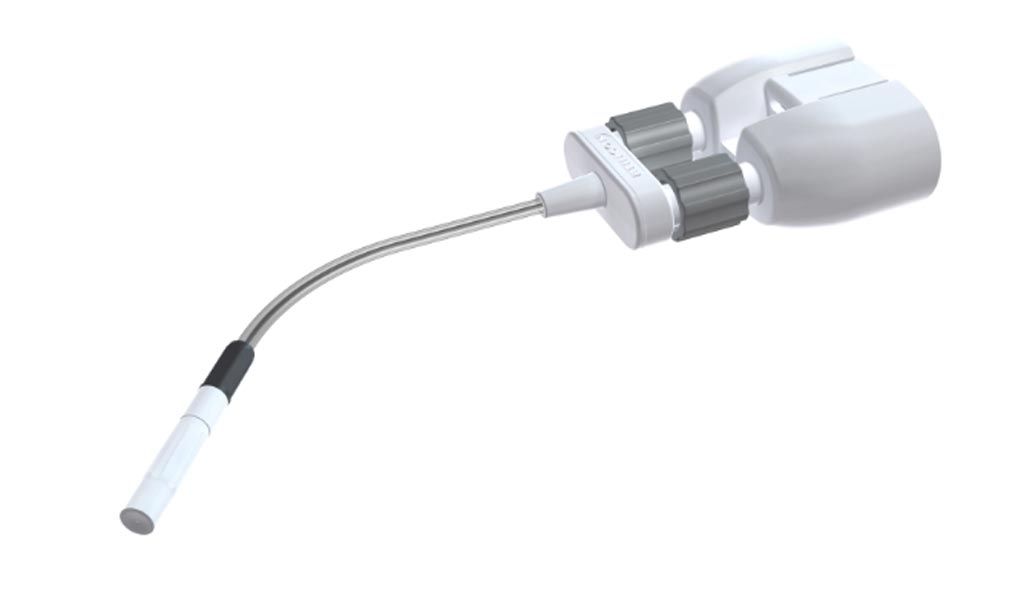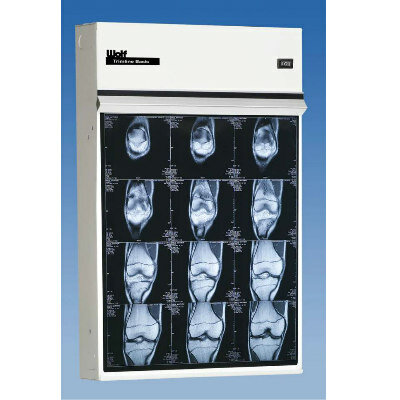Biological Sealant Stems Moderate Bleeding During Surgery
|
By HospiMedica International staff writers Posted on 01 Jul 2019 |

Image: The Vistaseal laparoscopic dual applicator (Photo courtesy of Ethicon).
An innovative airless spray delivers the clotting proteins fibrinogen and thrombin to stop bleeding when standard bleeding control techniques, such as sutures, are impractical.
The Ethicon Endo-Surgery (Ethicon; Cincinnati, OH, USA) Vistaseal Open and Laparoscopic dual applicators (available in 35 cm and 45 cm lengths) combine biologics with device technology to address mild to moderate surgical bleeding. The airless spray products are the result of a broad partnership between Ethicon and plasma-derived medicine manufacturer Grifols (Barcelona, Spain), which developed the human fibrin sealant for use when standard bleeding control techniques are inadequate.
The thrombin-catalyzed conversion of fibrinogen to fibrin consists of three reversible steps, with thrombin being involved in only the first step, which is a limited proteolysis to release fibrinopeptides (FpA and FpB) from fibrinogen to produce the fibrin monomer. In the second step, the fibrin monomers combine to form intermediate polymers through noncovalent interactions. In the third and final step, the intermediate polymers aggregate to form the fibrin clot, which stems the bleed.
“Ethicon’s biosurgery portfolio offers a broad array of technologies that address intraoperative bleeding, which is among the most difficult challenges facing surgeons and their patients,” said Oray Boston, president of worldwide biosurgery at Ethicon. “Our partnership with Grifols will leverage our strengths in device technology, with Grifols’ strengths in plasma-derived medicines to expand our portfolio and accelerate innovation in the fast growing field of biosurgery.”
“Grifols is committed to applying its plasma leadership to its collaboration with Ethicon, whose strengths in device technology and market success in reaching millions of patients worldwide enable us to make important advances in biosurgery and the control of surgical bleeding,” said Eduardo Herrero, president of Grifols Bioscience.
Johnson & Johnson (JNJ; New Brunswick, NJ, USA), the parent company of Ethicon, estimates that between one- and two-thirds of open surgery procedures experience disruptive bleeding events, with potentially harmful complications from both fluid and air leaks. In addition, they say that these numbers are expected to rise as more patients present with comorbidities and other factors (such as aspirin and blood thinners) increase the risk of surgical bleeding, due to an aging population.
The Ethicon Endo-Surgery (Ethicon; Cincinnati, OH, USA) Vistaseal Open and Laparoscopic dual applicators (available in 35 cm and 45 cm lengths) combine biologics with device technology to address mild to moderate surgical bleeding. The airless spray products are the result of a broad partnership between Ethicon and plasma-derived medicine manufacturer Grifols (Barcelona, Spain), which developed the human fibrin sealant for use when standard bleeding control techniques are inadequate.
The thrombin-catalyzed conversion of fibrinogen to fibrin consists of three reversible steps, with thrombin being involved in only the first step, which is a limited proteolysis to release fibrinopeptides (FpA and FpB) from fibrinogen to produce the fibrin monomer. In the second step, the fibrin monomers combine to form intermediate polymers through noncovalent interactions. In the third and final step, the intermediate polymers aggregate to form the fibrin clot, which stems the bleed.
“Ethicon’s biosurgery portfolio offers a broad array of technologies that address intraoperative bleeding, which is among the most difficult challenges facing surgeons and their patients,” said Oray Boston, president of worldwide biosurgery at Ethicon. “Our partnership with Grifols will leverage our strengths in device technology, with Grifols’ strengths in plasma-derived medicines to expand our portfolio and accelerate innovation in the fast growing field of biosurgery.”
“Grifols is committed to applying its plasma leadership to its collaboration with Ethicon, whose strengths in device technology and market success in reaching millions of patients worldwide enable us to make important advances in biosurgery and the control of surgical bleeding,” said Eduardo Herrero, president of Grifols Bioscience.
Johnson & Johnson (JNJ; New Brunswick, NJ, USA), the parent company of Ethicon, estimates that between one- and two-thirds of open surgery procedures experience disruptive bleeding events, with potentially harmful complications from both fluid and air leaks. In addition, they say that these numbers are expected to rise as more patients present with comorbidities and other factors (such as aspirin and blood thinners) increase the risk of surgical bleeding, due to an aging population.
Latest Surgical Techniques News
- First-Ever Contact Force Pulsed Field Ablation System to Transform Treatment of Ventricular Arrhythmias
- Caterpillar Robot with Built-In Steering System Crawls Easily Through Loops and Bends
- Tiny Wraparound Electronic Implants to Revolutionize Treatment of Spinal Cord Injuries
- Small, Implantable Cardiac Pump to Help Children Awaiting Heart Transplant
- Gastrointestinal Imaging Capsule a Game-Changer in Esophagus Surveillance and Treatment
- World’s Smallest Laser Probe for Brain Procedures Facilitates Ablation of Full Range of Targets
- Artificial Intelligence Broadens Diagnostic Abilities of Conventional Coronary Angiography
- AI-Powered Surgical Visualization Tool Supports Surgeons' Visual Recognition in Real Time
- Cutting-Edge Robotic Bronchial Endoscopic System Provides Prompt Intervention during Emergencies
- Handheld Device for Fluorescence-Guided Surgery a Game Changer for Removal of High-Grade Glioma Brain Tumors
- Porous Gel Sponge Facilitates Rapid Hemostasis and Wound Healing
- Novel Rigid Endoscope System Enables Deep Tissue Imaging During Surgery
- Robotic Nerve ‘Cuffs’ Could Treat Various Neurological Conditions
- Flexible Microdisplay Visualizes Brain Activity in Real-Time To Guide Neurosurgeons

- Next-Gen Computer Assisted Vacuum Thrombectomy Technology Rapidly Removes Blood Clots
- Hydrogel-Based Miniaturized Electric Generators to Power Biomedical Devices
Channels
Artificial Intelligence
view channel
AI-Powered Algorithm to Revolutionize Detection of Atrial Fibrillation
Atrial fibrillation (AFib), a condition characterized by an irregular and often rapid heart rate, is linked to increased risks of stroke and heart failure. This is because the irregular heartbeat in AFib... Read more
AI Diagnostic Tool Accurately Detects Valvular Disorders Often Missed by Doctors
Doctors generally use stethoscopes to listen for the characteristic lub-dub sounds made by heart valves opening and closing. They also listen for less prominent sounds that indicate problems with these valves.... Read moreCritical Care
view channel
One-Hour Endoscopic Procedure Could Eliminate Need for Insulin for Type 2 Diabetes
Over 37 million Americans are diagnosed with diabetes, and more than 90% of these cases are Type 2 diabetes. This form of diabetes is most commonly seen in individuals over 45, though an increasing number... Read moreAI Can Prioritize Emergecny Department Patients Requiring Urgent Treatment
Emergency departments across the world are facing severe overcrowding and excessive demands, but a new study indicates that artificial intelligence (AI) might soon assist in prioritizing patients who require... Read more
AI to Improve Diagnosis of Atrial Fibrillation
Abnormal heart rhythms frequently arise from—and contribute to—structural abnormalities in the heart. Atrial fibrillation is a specific type of abnormal rhythm that may not be consistently present, often... Read more
Stretchable Microneedles to Help In Accurate Tracking of Abnormalities and Identifying Rapid Treatment
The field of personalized medicine is transforming rapidly, with advancements like wearable devices and home testing kits making it increasingly easy to monitor a wide range of health metrics, from heart... Read morePatient Care
view channelFirst-Of-Its-Kind Portable Germicidal Light Technology Disinfects High-Touch Clinical Surfaces in Seconds
Reducing healthcare-acquired infections (HAIs) remains a pressing issue within global healthcare systems. In the United States alone, 1.7 million patients contract HAIs annually, leading to approximately... Read more
Surgical Capacity Optimization Solution Helps Hospitals Boost OR Utilization
An innovative solution has the capability to transform surgical capacity utilization by targeting the root cause of surgical block time inefficiencies. Fujitsu Limited’s (Tokyo, Japan) Surgical Capacity... Read more
Game-Changing Innovation in Surgical Instrument Sterilization Significantly Improves OR Throughput
A groundbreaking innovation enables hospitals to significantly improve instrument processing time and throughput in operating rooms (ORs) and sterile processing departments. Turbett Surgical, Inc.... Read moreHealth IT
view channel
Machine Learning Model Improves Mortality Risk Prediction for Cardiac Surgery Patients
Machine learning algorithms have been deployed to create predictive models in various medical fields, with some demonstrating improved outcomes compared to their standard-of-care counterparts.... Read more
Strategic Collaboration to Develop and Integrate Generative AI into Healthcare
Top industry experts have underscored the immediate requirement for healthcare systems and hospitals to respond to severe cost and margin pressures. Close to half of U.S. hospitals ended 2022 in the red... Read more
AI-Enabled Operating Rooms Solution Helps Hospitals Maximize Utilization and Unlock Capacity
For healthcare organizations, optimizing operating room (OR) utilization during prime time hours is a complex challenge. Surgeons and clinics face difficulties in finding available slots for booking cases,... Read more
AI Predicts Pancreatic Cancer Three Years before Diagnosis from Patients’ Medical Records
Screening for common cancers like breast, cervix, and prostate cancer relies on relatively simple and highly effective techniques, such as mammograms, Pap smears, and blood tests. These methods have revolutionized... Read morePoint of Care
view channel
Critical Bleeding Management System to Help Hospitals Further Standardize Viscoelastic Testing
Surgical procedures are often accompanied by significant blood loss and the subsequent high likelihood of the need for allogeneic blood transfusions. These transfusions, while critical, are linked to various... Read more
Point of Care HIV Test Enables Early Infection Diagnosis for Infants
Early diagnosis and initiation of treatment are crucial for the survival of infants infected with HIV (human immunodeficiency virus). Without treatment, approximately 50% of infants who acquire HIV during... Read more
Whole Blood Rapid Test Aids Assessment of Concussion at Patient's Bedside
In the United States annually, approximately five million individuals seek emergency department care for traumatic brain injuries (TBIs), yet over half of those suspecting a concussion may never get it checked.... Read more
New Generation Glucose Hospital Meter System Ensures Accurate, Interference-Free and Safe Use
A new generation glucose hospital meter system now comes with several features that make hospital glucose testing easier and more secure while continuing to offer accuracy, freedom from interference, and... Read moreBusiness
view channel
Johnson & Johnson Acquires Cardiovascular Medical Device Company Shockwave Medical
Johnson & Johnson (New Brunswick, N.J., USA) and Shockwave Medical (Santa Clara, CA, USA) have entered into a definitive agreement under which Johnson & Johnson will acquire all of Shockwave’s... Read more















